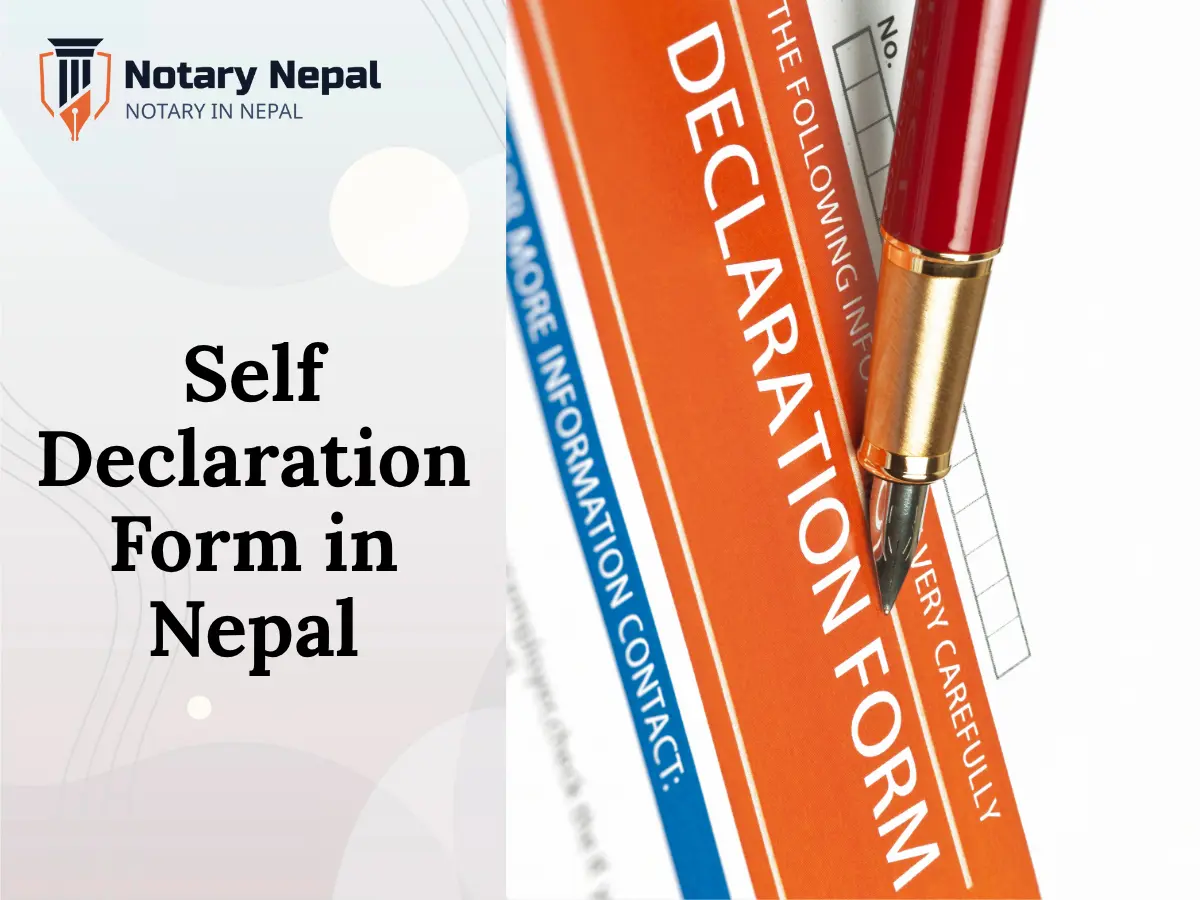

Table of Contents
In Nepal, self-declaration forms have become an essential part of legal, business, health, and travel processes. Whether you’re an individual, a business owner, or a student, understanding how to properly use and submit self-declaration forms can save you from unnecessary legal hurdles and delays. This comprehensive guide covers everything from types of self-declaration forms in Nepal to step-by-step instructions on filling them out, their legal validity, and tips to ensure your documents are accepted without issues.
What Is a Self-Declaration Form?
A self-declaration form is a written statement where an individual declares certain facts or information about themselves without the need for external verification at the time of submission. These forms carry legal weight and are often used in official processes such as visa applications, court cases, employment, and health declarations.
In Nepal, self-declaration forms are required in many sectors, especially with the growing need for transparency in legal and business dealings, as well as health safety measures during the COVID-19 pandemic.
History and Importance of Self-Declaration Forms in Nepal
Self-declaration forms have long been a part of Nepal’s legal and administrative framework. Traditionally, declarations were given orally or through affidavits in courts and local administrative offices. However, with the modernization of government processes and the rise of digital communication, self-declaration forms have become formalized and widely used across sectors.
Today, these forms are indispensable for facilitating smooth transactions in immigration, business licensing, education, and public health, ensuring compliance with Nepalese law while simplifying verification processes.
Key Types of Self-Declaration Forms in Nepal
Legal and Affidavit Self-Declarations
- Legal affidavits for court cases
- Proof of identity and residence declarations
- Property ownership declarations
Health and COVID-19 Self-Declarations
- Airport health declarations
- Quarantine and travel self-declarations
- COVID-19 symptom and exposure declarations
Employment and Income Self-Declarations
- Income proof affidavits
- Employment verification forms
- Salary declarations for loans or subsidies
Business and Taxation Declarations
- VAT and GST self-declarations
- Business registration affidavits
- Export/import declarations
Educational Self-Declarations
- Academic transcripts validation
- Scholarship application affidavits
- School attendance and absence declarations
Travel and Immigration Declarations
- Visa and embassy-related self-declarations
- Border crossing affidavits
- Passport-related declarations
How to Fill a Self-Declaration Form in Nepal: Step-by-Step Guide
- Obtain the Correct Form: Get the official form from the relevant authority, either online or from local government offices.
- Read Instructions Carefully: Understand the purpose of the declaration and any legal implications.
- Provide Accurate Information: Fill in personal details clearly and truthfully.
- State the Facts: Write concise statements affirming the required facts or conditions.
- Sign and Date: Sign the form to certify your declaration and note the date.
- Get the Form Notarized or Certified (If Required): Some declarations require authentication by a notary or government official.
- Submit the Form: Follow the submission guidelines—online upload, email, or physical submission.
Challenges in Self-Declaration in Nepal and How to Overcome Them
- Language Barriers: Some forms are only in Nepali. Seek help from translation or notary services if necessary.
- Lack of Standardization: Guidelines vary between offices. Always confirm the latest procedures.
- Document Verification: Self-declarations may require additional proofs; prepare backup documents.
- Submission Delays: Use online or courier services to avoid delays.
- Legal Implications: False declarations can lead to penalties; always be truthful.
Digital vs Hybrid Submission of Self-Declaration Forms in Nepal
Currently, Nepal does not have a fully digital notarization system. Instead, the process is hybrid:
- Users send documents via email, WhatsApp, or other digital means.
- The documents are printed, notarized physically.
- Notarized copies are sent back in digital format or couriered as hard copies.
- Clients can also pick up documents from the notary office.
This hybrid process combines convenience with legal authenticity.
Why You Need Professional Help with Self-Declaration Forms
Navigating the complexities of legal and official documentation can be overwhelming. Professional services, such as Notary Nepal, offer expertise in drafting, verifying, and notarizing self-declaration forms. They ensure that:
- Your forms comply with current legal standards.
- Cultural and language nuances are properly addressed.
- You avoid common mistakes that cause rejection.
- Confidentiality and timely processing are guaranteed.
FAQs on Self-Declaration Forms in Nepal
Q: Are self-declaration forms legally binding?
A: Yes, they carry legal weight and can be used as evidence in courts and government processes.
Q: Can I submit a self-declaration form online in Nepal?
A: Submission is hybrid; digital submission is accepted, but notarization is done physically.
Q: What happens if I provide false information?
A: False declarations can lead to legal penalties and rejection of your application.
Q: Do all self-declaration forms require notarization?
A: Not all, but many official and legal processes require notarized forms for authenticity.
Conclusion
Self-declaration forms in Nepal are crucial tools for simplifying legal, business, educational, and health-related procedures. Despite the challenges posed by linguistic diversity and the hybrid submission process, understanding how to properly fill and submit these forms ensures smooth compliance and communication.
By leveraging professional translation and notarization services, you can confidently navigate Nepal’s legal landscape and ensure your declarations are accurate, legally valid, and culturally appropriate. Break down language barriers and bureaucratic hurdles with expert assistance and take the first step toward hassle-free official documentation in Nepal.
Contact Notary Nepal
For professional assistance with your self-declaration forms and related notarization needs, contact:
+977 9765979296
www.notarynepal.com
This article is for informational purposes only and does not constitute legal advice, advertisement, or solicitation. Notary Nepal and its team are not liable for any consequences arising from reliance on this information. For legal advice, please contact us directly.


